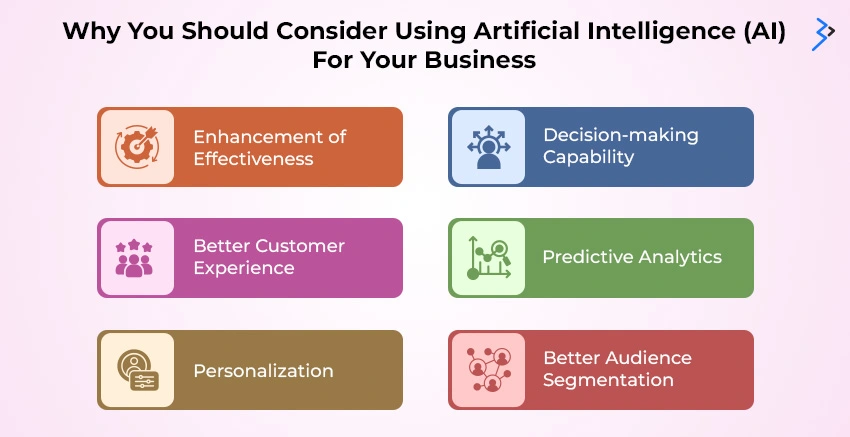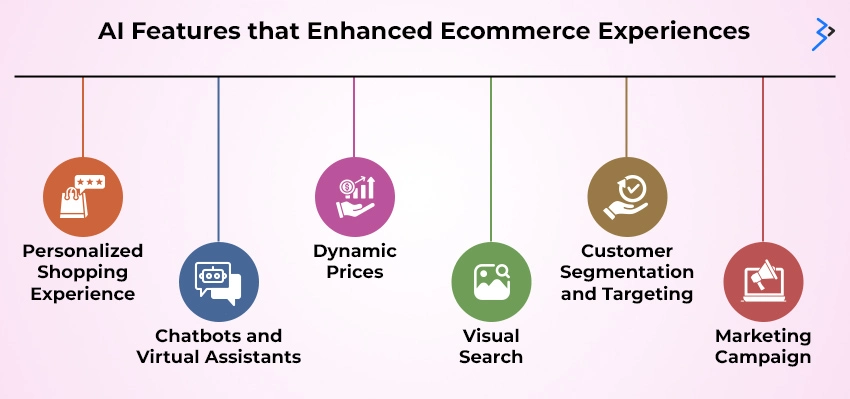In a world where technology is still revolutionizing sectors, thereby changing the face of business, artificial intelligence is at the forefront of innovation. Let us explore AI empowered as we work with Adobe – they are global leaders in digital experiences. Read how AI works to enhance consumers’ lives, processes operations, leads unprecedented development & reshapes companies. In the sphere of this digital era, AI discovers new ways that businesses can upgrade, for example, by making predictions and suggesting how it should be done better. With Adobe, study the connection between AI and business and embark on a journey toward an infinitely innovative future.
What’s that all about Artificial intelligence?
Artificial intelligence (AI), especially machine learning and deep learning, refers to computer programs that imitate human cognitive abilities. Machines can learn from data by using these techniques autonomously. AI has many uses across industries, such as health diagnostics, catching fraudsters in financial services, self-driving cars, and generative AI tools that mimic humans in writing text, creating images, or code.
Why You Should Consider Using Artificial Intelligence (AI) For Your Business

Integrating your business with AI tools in today’s complex marketplace can have profound implications for your financial situation and competitive advantage. There are some valid reasons why every company needs to embrace AI:
Enhancement of Effectiveness
The effect that AI has had on various operations within eCommerce is exemplified by its impact on such things as order processing, inventory control, and customer care. This leads to the efficient functioning of a company through the reduction of human errors when specific processes are automated, saving time and money. This in turn creates efficiency which gives a business a cutting edge over others, thereby reducing costs hence improving productivity.
Enhancement of Decision-making Capability
Businesses are empowered by AI with data analysis. Through the utilization of AI, companies can make more accurate decisions instantly. This capability helps companies identify areas for growth, optimize pricing strategies, or adapt quickly to market changes, creating better decision-making and improving business performance.
Better Customer Experience
AI eCommerce platforms facilitate mass-customized consumer engagements. By analyzing customer data as well as their behavior toward products or services offered by firms, organizations are able to customize product recommendation, marketing messages and even shopping experiences according to individual preferences. Consequently, customer satisfaction is increased through improved customer experience which enhances long-term customer relationships thus improving revenue growth and repeat purchases as well as encouraging loyalty among customers.

Predictive Analytics
In eCommerce, businesses can predict what is to be expected of the future and target customer needs by customer segmentation, thus optimizing their stock levels using AI-powered predictive analytics. With help from artificial intelligence (AI) systems based on previous data and patterns, future events can be forecasted with great accuracy. They permit companies to take prior steps in managing demand fluctuations, reducing stockouts, and optimizing sales chances.
Personalization
Machine learning algorithms employed by AI-powered eCommerce sites deliver tailored purchasing experiences. By understanding individual preferences, browsing history, and purchase behavior, companies can give personalized product suggestions, individualized promotions, or targeted marketing campaigns. This personalization improves client interaction and also boosts revenues through conversion rates.
Segment the Audience
AI complicates consumer segmentation by breaking down the target market into different categories based on preferences, behavior, and demography. This would enable them to improve the quality of goods offered, develop targeted campaigns, and customize communication strategies for specific customer groups. This strategy improves customer engagement and marketing effectiveness and also improves return on marketing investments.
AI in eCommerce
AI will drive a 59% increase in product recommendations for online retailers. Among its applications are improved user experiences, simpler business operations, and an increase in transactions for both consumers and enterprises. These include smart search functionalities, product assistants, inventory management systems, and dynamic price controls, among others, such as chatbots offering round-the-clock assistance or virtual assistants creating personalized content to enhance engagement levels and conversions.
Adobe B2B Commerce relies on artificial intelligence (AI) for business insights and process automation tools to help online sellers reduce prices on their goods, satisfy customer demand accurately, and reach out to untapped markets.
AI Features of Adobe Commerce that Enhanced Ecommerce Experiences

The eCommerce industry is increasingly important in the adoption of AI features in Adobe Commerce that companies seek to maintain a competitive edge and deliver great customer experiences. Understanding the importance of using AI technologies such as chatbots, virtual assistants, dynamic pricing, visual search, and customer segmentation is crucial for an Adobe Commerce developer to optimize their Adobe Commerce platform.
Personalized Shopping Experience
Among the key advantages of eCommerce is its potential for AI to provide clients with a personalized shopping experience. By evaluating customer data through the use of AI algorithms, browsing history, purchase behavior, and individual preferences can be used by Adobe Commerce to make personalized product recommendations. This level of personalization enhances conversion rates and cultivates brand loyalty along with enhanced customer satisfaction.
Chatbots and Virtual Assistants
Adobe Commerce Cloud includes chatbots and virtual assistants that can change customer service into one where consumers get immediate assistance, responses, and purchase advice. These AI systems guarantee timely responses and real-time interaction and communication, which can make complex interactions simple, provide immediate support, and increase customer satisfaction.
Dynamic Prices
One of the most important AI capabilities for eCommerce stores is dynamic pricing. It is a system that helps companies to adjust their prices depending on the consumer’s behavior, competitor pricing, and demand. Adobe Commerce Cloud can be used to conveniently automate the process. Service partners of Adobe can make it easier to create dynamic pricing strategies that are tailored for any particular business.
Visual Search
Image recognition technology is changing how buyers look for products and services. Adobe Commerce Cloud provides the capability to integrate visual search, which allows consumers to look for products using images rather than text. Visual Search features can also be employed and enhanced by working with Adobe Service Partners to enhance the shopping experience and conversions.
Customer Segmentation and Targeting
Customized marketing initiatives for these businesses can depend on Adobe Analytics, which helps them identify behaviors among their customers in groups distinguishable by several factors. Also, integration with Adobe Commerce Cloud ensures data can be easily shared between platforms to create accurate marketing segments that drive more engagement, resulting in higher sales.
Marketing Campaign
AI gives marketing campaigns a more targeted approach through personalization. Thanks to the integration of Adobe Commerce Cloud businesses can use AI to generate and refine marketing campaigns to achieve maximum efficiency. The use of features by Service Partners in collaborating with Adobe can also work to the advantage of improving the performance of a given campaign.
Adobe AI Tools

Adobe is a top digital marketing provider, which provides many AI-based tools for improved customer satisfaction with business growth. They are part of the family of Adobe Experience Cloud products that also have broad marketing and analytical capabilities.
- Adobe Sensei: Adobe Sensei is a strong artificial intelligence tool that assists marketers in forecasting client behavior and controlling advertising expenses by utilizing analytics, detailed consumer insights and data mining for tracking customer journeys.
- AI-Based Search: Thus they speed up their AI-powered search engines by apps like Adobe Sensei, providing precious insights as well as improving campaign conversion rates.
- Adobe Analytics: Adobe analytics is a vital marketing metric that enables businesses to track campaign impact and optimize them for higher ROIs.
- Adobe Journey Optimizer: Using predictive data to target high-value customers, plan extensive client journeys, and boost ROI on promotions, Adobe Journey Optimizer simplifies the organization’s marketing automation strategy.
AI Advantages in Adobe Commerce
- Better targeting and Marketing: AI in Adobe Commerce provides the ability to precisely reach customers who want it and behave in a certain way, which leads to more effective marketing strategies.
- Customer retention: Companies that use the creation of Adobe Commerce can use analytics with the help of artificial intelligence to identify patterns that help them retain customers with incentives and tailored experiences.
- Better customer segment: Adobe Commerce development based on AI tools helps segment consumers in accordance with various features for better personalization of marketing activities.
- Customer Information: AI technologies are used in Adobe to gather and analyze vast amounts of client information and provide valuable insights that can be applied to make better products and services.
- Identifying optimal Pricing: AI algorithms can analyze purchase preferences and trends in Adobe Commerce and identify the best price options.
- Supply chain Optimization: AI in Adobe Commerce development predicts demand, balances inventory, and increases general efficiency to facilitate a faster supply chain.
- Improved and more reliable customer service: In Adobe Commerce, AI-based chatbots and virtual assistants enhance consumer interactions through quick responses to questions and higher levels of satisfaction.
AI Implementation Challenges
This table simplifies the process of introducing AI into the business which are already using adobe commerce. It indicates the most common challenges of implementing AI technologies and possible solutions for each.
| Challenge | Description | Solution |
| AI Integration into Existing Systems | Implementing AI in an existing system is difficult enough, but ensuring that the new and old technologies work together is even harder. | Draw up a strategic plan of implementation, adopt middleware architecture, and invest in staff training. |
| Data Quality and Availability | The AI needs to have access to relevant and correct data for accurate forecasts. | Adopt strong data management policies, apply data cleaning functions, and monitor data regularly. |
| Privacy and Security Concerns | These include loss of personal information, disclosure of personal information, and statutory law violations. Implement strong encryption protocols and abide by all applicable laws and regulations. | Governments should enact strong privacy laws, such as GDPR, and ensure access to user data is limited. |
| High Initial Costs | Purchasing the AI tools and building the necessary infrastructure can be costly initially. | Start cloud-based AI services that will help cut infrastructure costs, apply for funding or grants, and estimate the investment’s long-term ROI. |
| User Experience | It states that the purpose of an AI system is to satisfy requirements without annoying end users. | Design with users in mind and conduct usability testing; Provide extensive training and maintenance. |
Future of AI in eCommerce
A set of few valuable advances in artificial intelligence (AI) in eCommerce can literally turn the industry upside down:
- Hyper-personalization: AI algorithms might be used by eCommerce websites to offer hyper-personalization reviews, like customized product hints and centered advertising campaigns.
- Visual Search and Augmented Reality: Users can use AI-powered visible search by uploading photos to find objects, and they can use augmented reality to locate objects in their environment or place them digitally to enhance their shopping experience.
- Conversational Commerce: Artificial intelligence-powered chatbots and virtual assistants will offer customers real-time assistance and direction, expediting the purchasing process and raising customer happiness.
- Voice Commerce: Amazon Echo and Alexa will continue to provide shoppers a way to buy products hands-free by voice while the customer is outside of the store or at work.
Future of AI in the Adobe Commerce
Adobe Commerce Security can help businesses maximize AI’s potential for growth, innovation, and strategic goals. The marketplace for AI-enabled e-exchange is predicted to attain $16.8 billion through 2030. Incorporation of Artificial Intelligence technology in its systems enhances competitiveness, expedites processes, and improves customer experiences for Adobe Commerce. Partnering with an AEM implementation partner can further optimize these integrations, ensuring seamless digital experiences and enhanced operational efficiency. Additionally, it allows organizations to streamline operations, increase productivity, and attain goals while providing a continuous and steady experience for stakeholders and clients.
FAQ
Mimicking human behavior now thanks to technologies like chat-bots, fraud detection systems and artificial recommendation systems.
AI is useful in eCommerce companies because it can automate operations, boost sales, improve customer services, and perfect inventory control. By facilitating streamlined operations and personalized experiences, small businesses can gain a competitive edge.
AI can help eCommerce groups automate strategies, grow sales, improve customer service structures, and enhance inventory control.
Some of these demanding situations include excessive preliminary costs, concerns over privacy problems, and the chance of poor client experience if an e-trade platform is not properly managed.
eCommerce advertising, marketing, and sales are powered by AI via customized product hints, centered ads, pricing strategies, and forecasts of customer behavior.
Smart products in eCommerce companies are powered by Adobe Sensei which comes up with ways to automate, personalize or give insights.
The company’s AI-driven analytics provides information about what customers do on websites, such as what they click or do not click, and measures marketing success and revenue from eCommerce.
Related Articles
-
Guide on SearchGPT: AI-Based Search Feature
Introduction The concept of organic search isn’t new to business owners! Over the last two decades, Search Engine Optimization (SEO) has driven organic visibility for brands and businesses worldwide. Nearly
-
The Future of Business Is Here: Artificial Intelligence and Odoo ERP
Businesses have unquestionably transformed in recent years thanks to artificial intelligence (AI), which has opened up previously unimaginable opportunities for expansion and reinvention. Odoo Enterprise Resource Planning (ERP) has also
-
Difference Between Artificial Intelligence and Machine Learning
The world of technology is evolving, but our approach to communicating these advancements are dated. As a result, we see a lot of people confused about key technological concepts. Generally,




